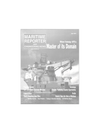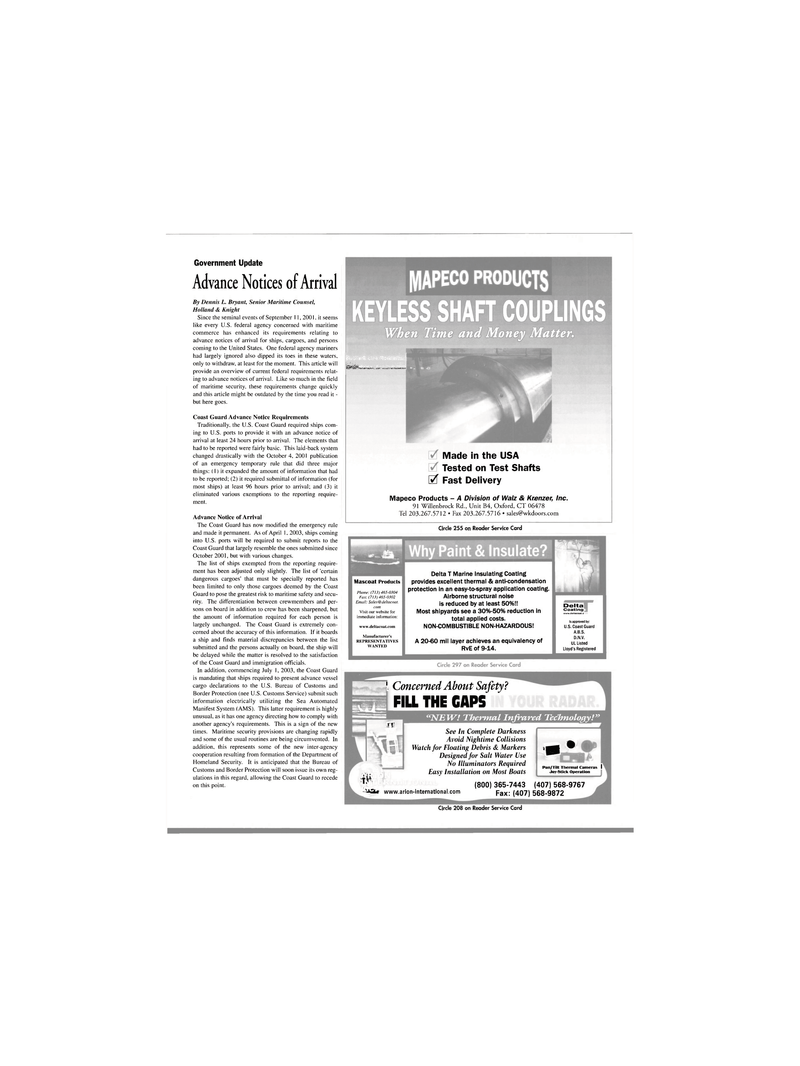
Page 19: of Maritime Reporter Magazine (April 2003)
Read this page in Pdf, Flash or Html5 edition of April 2003 Maritime Reporter Magazine
HIAPECO PRODUCTS
KEYLESS SHAFT COUPLINGS
When Time and Money Matter.
HHHHHJHHj ^
Government Update
Advance Notices of Arrival
By Dennis L. Bryant, Senior Maritime Counsel,
Holland & Knight
Since the seminal events of September 11, 2001, it seems like every U.S. federal agency concerned with maritime commerce has enhanced its requirements relating to advance notices of arrival for ships, cargoes, and persons coming to the United States. One federal agency mariners had largely ignored also dipped its toes in these waters, only to withdraw, at least for the moment. This article will provide an overview of current federal requirements relat- ing to advance notices of arrival. Like so much in the field of maritime security, these requirements change quickly and this article might be outdated by the time you read it - but here goes.
Coast Guard Advance Notice Requirements
Traditionally, the U.S. Coast Guard required ships com- ing to U.S. ports to provide it with an advance notice of arrival at least 24 hours prior to arrival. The elements that had to be reported were fairly basic. This laid-back system changed drastically with the October 4, 2001 publication of an emergency temporary rule that did three major things: (I) it expanded the amount of information that had to be reported; (2) it required submittal of information (for most ships) at least 96 hours prior to arrival; and (3) it eliminated various exemptions to the reporting require- ment.
Advance Notice of Arrival
The Coast Guard has now modified the emergency rule and made it permanent. As of April 1, 2003, ships coming into U.S. ports will be required to submit reports to the
Coast Guard that largely resemble the ones submitted since
October 2001, but with various changes.
The list of ships exempted from the reporting require- ment has been adjusted only slightly. The list of 'certain dangerous cargoes' that must be specially reported has been limited to only those cargoes deemed by the Coast
Guard to pose the greatest risk to maritime safety and secu- rity. The differentiation between crewmembers and per- sons on board in addition to crew has been sharpened, but the amount of information required for each person is largely unchanged. The Coast Guard is extremely con- cerned about the accuracy of this information. If it boards a ship and finds material discrepancies between the list submitted and the persons actually on board, the ship will be delayed while the matter is resolved to the satisfaction of the Coast Guard and immigration officials.
In addition, commencing July 1, 2003, the Coast Guard is mandating that ships required to present advance vessel cargo declarations to the U.S. Bureau of Customs and
Border Protection (nee U.S. Customs Service) submit such information electrically utilizing the Sea Automated
Manifest System (AMS). This latter requirement is highly unusual, as it has one agency directing how to comply with another agency's requirements. This is a sign of the new times. Maritime security provisions are changing rapidly and some of the usual routines are being circumvented. In addition, this represents some of the new inter-agency cooperation resulting from formation of the Department of
Homeland Security. It is anticipated that the Bureau of
Customs and Border Protection will soon issue its own reg- ulations in this regard, allowing the Coast Guard to recede on this point.
Made in the USA
Tested on Test Shafts 0 Fast Delivery
Mapeco Products - A Division of Walz & Krenzer, Inc. 91 Willenbrock Rd„ Unit B4, Oxford, CT 06478
Tel 203.267.5712 • Fax 203.267.5716 • [email protected]
Circle 255 on Reader Service Card
Mascoat Products
Phone: (713) 465-0304
Fax: (713) 465-0302
Email: Sales @dellacoat. com
Visit our website for immediate information: www.deltacoat.com
Manufacturer's
REPRESENTATIVES
WANTED
Delta T Marine Insulating Coating provides excellent thermal & anti-condensation protection in an easy-to-spray application coating.
Airborne structural noise is reduced by at least 50%!!
Most shipyards see a 30%-50% reduction in total applied costs.
NON-COMBUSTIBLE NON-HAZARDOUS!
A 20-60 mil layer achieves an equivalency of
RvE of 9-14.
Delta
Coating www.deitocoat.c
Is approved by:
U.S. Coast Guard
A.B.S.
D.N.V.
UL Listed
Lloyd's Registered 1 Concerned About Safety?
FILL THE CAPS rv "NE W! Thermal Infrared Technology!" •tf$ i Yli a-m
See In Complete Darkness
Avoid Nightime Collisions
Watch for Floating Debris & Markers
Designed for Salt Water Use
No Illuminators Required
Easy Installation on Most Boats "•I * •HBP-
I Pan/Tilt Thermal Cameras 1
Joy-Stick Operation kUSyr www.arion-international.com (800) 365-7443 (407) 568-9767
Fax: (407) 568-9872
Circle 208 on Reader Service Card

 18
18

 20
20
